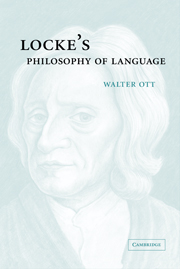Book contents
- Frontmatter
- Contents
- Acknowledgements
- Note on textual references
- Introduction
- 1 Signs and signification
- 2 Particles and propositions
- 3 Essence and abstraction
- 4 Locke contra the Aristotelians: signification and definition
- 5 Beyond the bounds of sense?
- 6 The reception of Locke's philosophy of language
- 7 Conclusion
- Bibliography
- Index
2 - Particles and propositions
Published online by Cambridge University Press: 22 September 2009
- Frontmatter
- Contents
- Acknowledgements
- Note on textual references
- Introduction
- 1 Signs and signification
- 2 Particles and propositions
- 3 Essence and abstraction
- 4 Locke contra the Aristotelians: signification and definition
- 5 Beyond the bounds of sense?
- 6 The reception of Locke's philosophy of language
- 7 Conclusion
- Bibliography
- Index
Summary
Before we can proceed to apply Locke's views on language to other topics, we must fill a lacuna that has been left by the preceding chapter. So far we have seen nothing at all from Locke about the crucial issues of propositional content and attitude. If we were to take Locke at his word in the early chapters of Book III, his position would be hopelessly unable to account for the feature that differentiates a proposition from a mere list of items, and for whatever differentiates such propositional attitudes as belief, doubt, supposition, and so on. As we shall see, Locke's position has the resources to meet these demands.
Locke states his linguistic thesis in Book III as if it applied to all words whatsoever. But even if we grant that nouns and predicates signify ideas (confining ourselves to declarative sentences), it is hardly plausible to think that words such as “is,” “and,” and “but” work in this way. There is a hoary tradition that runs from Aristotle (De Interpretatione 16b20 and 20a13) through the medievals and early moderns that distinguishes “categorematic” words (such as nouns and predicates), which can be significant on their own, from “syncategorematic” words, such as those listed above, which cannot. Into the latter class fall the logical connectives, the copula, and prepositions, among others. The difficulty with Locke's view is that it seems to have no place for syncategoremata. The central case we shall examine is that of the copula.
- Type
- Chapter
- Information
- Locke's Philosophy of Language , pp. 34 - 52Publisher: Cambridge University PressPrint publication year: 2003



